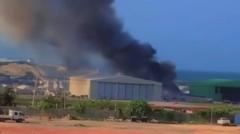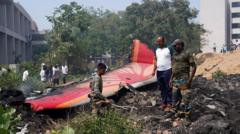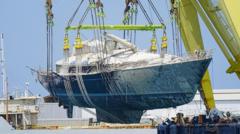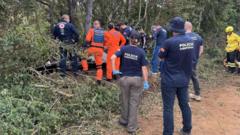Scientists at a remote Antarctic research base face turmoil as allegations of physical assault emerge, prompting urgent responses from the South African government.
**Alleged Assault Claims Disrupt Antarctic Research Expedition**
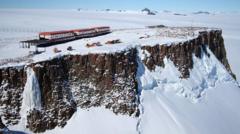
**Alleged Assault Claims Disrupt Antarctic Research Expedition**
A serious incident at the South African-run Sanae IV research station raises concerns about team dynamics under extreme conditions.
The Sanae IV research station, located approximately 170 kilometers from the Antarctic ice shelf and known for its harsh living conditions, has been the site of severe allegations against a member of the scientific team set to conduct research over the upcoming winter months. The station typically hosts nine personnel who are expected to endure extreme isolation and harsh weather conditions for about 13 months. However, the tranquility of their mission was disrupted when allegations of physical assault were reported.
A spokesperson for the South African government confirmed that the Ministry of Environmental Affairs was aware of an assault at the station, following earlier incidents of inappropriate behavior that reportedly contributed to a climate of fear among the team members. Media outlets have revealed that some researchers sought evacuation from the station due to the unfolding crisis.
To address the allegations quickly, South Africa's Ministry has assured that thorough background checks, medical assessments, and psychological evaluations had been conducted prior to deployment, all of which were apparently passed by the personnel involved. Despite this, the Ministry acknowledged that adjustments to extreme environments can lead different individuals to experience various psychological reactions, even if initial assessments seemed satisfactory.
On February 27, the Ministry was made aware of the incident, prompting them to activate a contingency plan aimed at restoring order and improving interpersonal relations among team members. The response included a commitment to managing allegations of sexual harassment with thorough investigations. Meanwhile, it was stated that the initial claims of sexual assault had been deemed incorrect.
In a follow-up statement, it was revealed that the alleged offender has participated in psychological evaluations, expressed remorse for their actions, and has made a formal apology to the victim. Such incidents are rare but not unheard of in Antarctic research, with historical cases highlighting the unique challenges faced in isolation.
Experts in workplace psychology attribute these types of incidents to the intense and prolonged close-contact environment, warning that minor conflicts can escalate significantly under such extreme conditions.
As discussions continue regarding potential emergency evacuation options, logistics may prove challenging due to Antarctica's brutal weather, with freezing temperatures and high winds complicating any rescue efforts.
The situation remains fluid as updates from the South African government and Antarctic research community are awaited, while the complexities of interpersonal relationships in isolated environments become increasingly apparent amidst this alarming incident.
A spokesperson for the South African government confirmed that the Ministry of Environmental Affairs was aware of an assault at the station, following earlier incidents of inappropriate behavior that reportedly contributed to a climate of fear among the team members. Media outlets have revealed that some researchers sought evacuation from the station due to the unfolding crisis.
To address the allegations quickly, South Africa's Ministry has assured that thorough background checks, medical assessments, and psychological evaluations had been conducted prior to deployment, all of which were apparently passed by the personnel involved. Despite this, the Ministry acknowledged that adjustments to extreme environments can lead different individuals to experience various psychological reactions, even if initial assessments seemed satisfactory.
On February 27, the Ministry was made aware of the incident, prompting them to activate a contingency plan aimed at restoring order and improving interpersonal relations among team members. The response included a commitment to managing allegations of sexual harassment with thorough investigations. Meanwhile, it was stated that the initial claims of sexual assault had been deemed incorrect.
In a follow-up statement, it was revealed that the alleged offender has participated in psychological evaluations, expressed remorse for their actions, and has made a formal apology to the victim. Such incidents are rare but not unheard of in Antarctic research, with historical cases highlighting the unique challenges faced in isolation.
Experts in workplace psychology attribute these types of incidents to the intense and prolonged close-contact environment, warning that minor conflicts can escalate significantly under such extreme conditions.
As discussions continue regarding potential emergency evacuation options, logistics may prove challenging due to Antarctica's brutal weather, with freezing temperatures and high winds complicating any rescue efforts.
The situation remains fluid as updates from the South African government and Antarctic research community are awaited, while the complexities of interpersonal relationships in isolated environments become increasingly apparent amidst this alarming incident.





